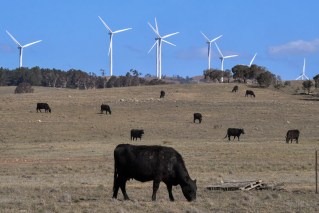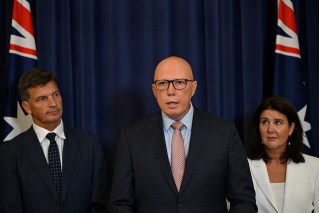How Donald Trump’s empathy card compares with other US presidents


Donald Trump paying tribute to those slain at the Tree of Life synagogue in Pittsburgh in November. Photo: Getty Photo: Getty
US President Donald Trump stood alongside the families left devastated by the Pittsburgh synagogue shooting, but offered no public remarks of consolation.
Mr Trump later tweeted that Pittsburgh had treated him “warmly” and showed his office great respect on a “sad and solemn day”. But some of his off-the-cuff remarks – including the suggestion victims may not have been killed if there was armed “protection” – have called his capacity for empathy, or at least to manifest empathy, into question.
Melania and I were treated very nicely yesterday in Pittsburgh. The Office of the President was shown great respect on a very sad & solemn day. We were treated so warmly. Small protest was not seen by us, staged far away. The Fake News stories were just the opposite-Disgraceful! pic.twitter.com/9B9HgCF1G9
— Donald J. Trump (@realDonaldTrump) October 31, 2018
The rabbi of the Tree of Life synagogue, where 11 people were brutally slain last weekend, went so far as to say he was “surprised” to experience Mr Trump’s consoling side.
“I must say, throughout the time we spent together, I was pleasantly surprised by a warm and personal side to the President that I don’t think America has ever seen,” he said.
Mr Trump had condemned the shootings, but refused to cancel a planned political rally amid national grief. He complained to the crowd that the “very unfortunate news conference” where he commented on the synagogue killings, had caused a bad hair day.
“The wind was blowing and the rain and I was soaking wet, and that’s what I ended up with today,” he told the crowd, pointing to his hair.
“And I said, maybe I should cancel this arrangement, because I have a bad hair day. And the bad news, somebody said actually it looks better than it usually does.”
US presidents are expected to visit relief efforts, emergency evacuations, initiate policy to protect their citizens from vicious crimes like mass shootings, but there’s also an expectation that Presidents address the emotional impact of disasters.
University of Canberra governance and policy analysis senior research fellow Michael Jensen told The New Daily that Mr Trump had never shown an ability to connect with, or democratically sense the needs of the nation as a whole. But he did have an ability to connect with his support base.
“A lot of leaders try to figure out what people are feeling, the wider expanse of the public, but [Mr] Trump is different from other leaders,” he said.
“He’s given his focus to his base [supporters] and he doesn’t have to worry that this or that group is suffering.”
The 45th US President demonstrated this awkward inability to comfort those in need in a series of exchanges with victims of Hurricane Florence in North Carolina in September, which satirist Stephen Colbert described as “disturbingly inappropriate to the scale of this tragedy”.
Surveying the devastation, Mr Trump saw a yacht beached in a resident’s backyard and said: “At least you got a nice boat out of the deal.”
what a pool report from @MarkLandler pic.twitter.com/XeFtW6gQYa
— Emily Cochrane (@ESCochrane) September 19, 2018
Critics also blasted his handling of Hurricane Maria in Puerto Rico, where he lobbed rolls of toilet paper at victims while touring the island in 2017.
And this is how Trump’s predecessors did it
When Barack Obama toured the damage of Superstorm Sandy in 2012, he reassured victims about his ongoing presence through the clean-up and rebuild.
“We are going to be here until the rebuild is complete and I mean it,” Mr Obama said. “So I’m going to come back today, but I’m also going to be coming back in the future to make sure we have followed through”.
Mr Obama also sparked the nation’s imagination when he spontaneously broke into song – to rapturous applause and singing – at a memorial service honouring the victims of church shooting in Charleston, South Carolina, in 2015.
Though there was much criticism of President George W. Bush’s response during Hurricane Katrina in 2005 and a photo of him surveying the damage from the comfort of Air Force One, he did prove his ability to empathise following the terrorist attack of the World Trade Centre in 2001.
Touring the devastation of Ground Zero, Mr Bush heard a person call out: “We can’t hear you,” Speaking through a bull, he responded: “I can hear you. The rest of the world hears you. And the people who knocked these buildings down will hear all of us soon.”
Among US presidents of the modern era, many people consider Ronald Reagan to be one of the most empathetic. National Public Radio’s senior editor and correspondent Ron Elving told the broadcaster this week that President Reagan’s national address after the Challenger spacecraft disaster will go down as one of the most memorable.
“It was chilling. It was warming. It was moving,” Elving said. “And everyone who remembers the president saying it in real time – that is their Challenger moment.”








